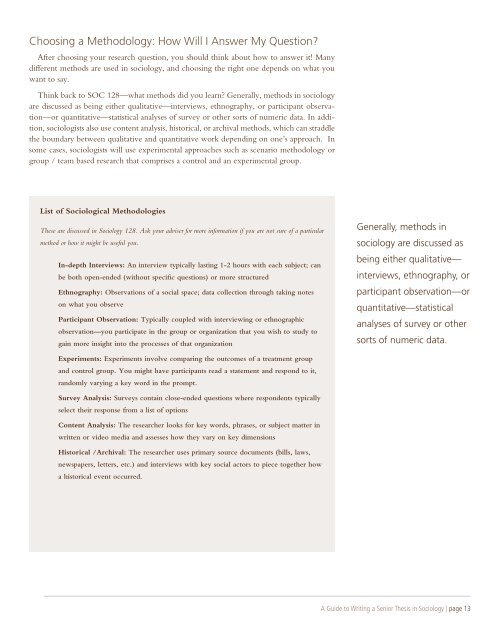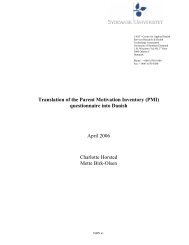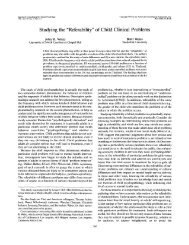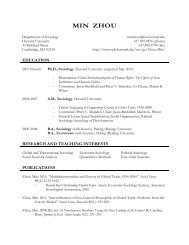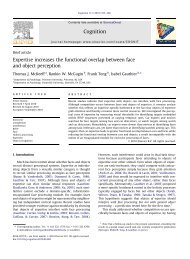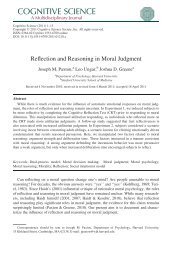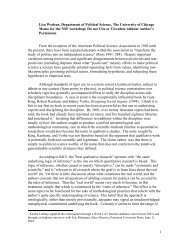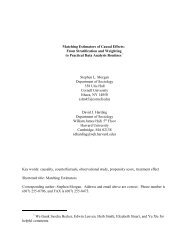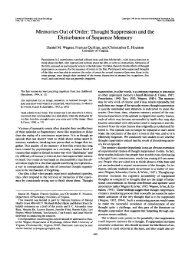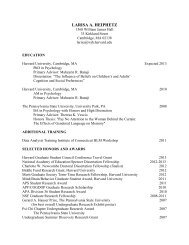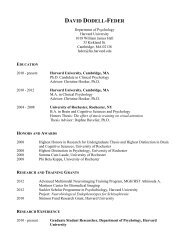A Guide to Writing a Senior Thesis in Sociology - WJH Home Page ...
A Guide to Writing a Senior Thesis in Sociology - WJH Home Page ...
A Guide to Writing a Senior Thesis in Sociology - WJH Home Page ...
You also want an ePaper? Increase the reach of your titles
YUMPU automatically turns print PDFs into web optimized ePapers that Google loves.
Choos<strong>in</strong>g a Methodology: How Will I Answer My Question?<br />
After choos<strong>in</strong>g your research question, you should th<strong>in</strong>k about how <strong>to</strong> answer it! Many<br />
different methods are used <strong>in</strong> sociology, and choos<strong>in</strong>g the right one depends on what you<br />
want <strong>to</strong> say.<br />
Th<strong>in</strong>k back <strong>to</strong> SOC 128—what methods did you learn? Generally, methods <strong>in</strong> sociology<br />
are discussed as be<strong>in</strong>g either qualitative—<strong>in</strong>terviews, ethnography, or participant observation—or<br />
quantitative—statistical analyses of survey or other sorts of numeric data. In addition,<br />
sociologists also use content analysis, his<strong>to</strong>rical, or archival methods, which can straddle<br />
the boundary between qualitative and quantitative work depend<strong>in</strong>g on one’s approach. In<br />
some cases, sociologists will use experimental approaches such as scenario methodology or<br />
group / team based research that comprises a control and an experimental group.<br />
List of Sociological Methodologies<br />
These are discussed <strong>in</strong> <strong>Sociology</strong> 128. Ask your adviser for more <strong>in</strong>formation if you are not sure of a particular<br />
method or how it might be useful you.<br />
In-depth Interviews: An <strong>in</strong>terview typically last<strong>in</strong>g 1-2 hours with each subject; can<br />
be both open-ended (without specific questions) or more structured<br />
Ethnography: Observations of a social space; data collection through tak<strong>in</strong>g notes<br />
on what you observe<br />
Participant Observation: Typically coupled with <strong>in</strong>terview<strong>in</strong>g or ethnographic<br />
observation—you participate <strong>in</strong> the group or organization that you wish <strong>to</strong> study <strong>to</strong><br />
ga<strong>in</strong> more <strong>in</strong>sight <strong>in</strong><strong>to</strong> the processes of that organization<br />
Experiments: Experiments <strong>in</strong>volve compar<strong>in</strong>g the outcomes of a treatment group<br />
and control group. You might have participants read a statement and respond <strong>to</strong> it,<br />
randomly vary<strong>in</strong>g a key word <strong>in</strong> the prompt.<br />
Survey Analysis: Surveys conta<strong>in</strong> close-ended questions where respondents typically<br />
select their response from a list of options<br />
Content Analysis: The researcher looks for key words, phrases, or subject matter <strong>in</strong><br />
written or video media and assesses how they vary on key dimensions<br />
His<strong>to</strong>rical /Archival: The researcher uses primary source documents (bills, laws,<br />
newspapers, letters, etc.) and <strong>in</strong>terviews with key social ac<strong>to</strong>rs <strong>to</strong> piece <strong>to</strong>gether how<br />
a his<strong>to</strong>rical event occurred.<br />
Generally, methods <strong>in</strong><br />
sociology are discussed as<br />
be<strong>in</strong>g either qualitative—<br />
<strong>in</strong>terviews, ethnography, or<br />
participant observation—or<br />
quantitative—statistical<br />
analyses of survey or other<br />
sorts of numeric data.<br />
A <strong>Guide</strong> <strong>to</strong> <strong>Writ<strong>in</strong>g</strong> a <strong>Senior</strong> <strong>Thesis</strong> <strong>in</strong> <strong>Sociology</strong> | page 13


